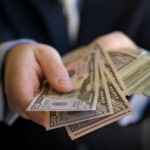How Do the Rich Vote? Follow the Money
 The best evidence about the political views of the super-rich comes not from unreliable surveys but from actually tracking their contributions.
The best evidence about the political views of the super-rich comes not from unreliable surveys but from actually tracking their contributions.
In response to my recent blogpost arguing that the rich really are more Republican, FrumForum reader Ken writes that the truly wealthy "vote Democrat by a margin of two to one." Ken cites a Wall Street Journal article from 2008 to support this claim. Unfortunately, the statistics in that article are unsourced. Robert Frank, the author of this article, cites a survey by Prince & Associates. Back when that article came out, I tried to track down the data and the claim and got nowhere. Here's what I wrote back in 2008:
Do I believe [the claim that voters worth $30 million or more were favoring Barack Obama]? Not really. My problem here is that I don’t know where the survey is coming from. How did Prince & Associates sample people making $30 million or more? Without knowing at least something about the sampling, it’s hard to say anything at all about these claims. For example, a graph accompanying the article linked above gives estimates of about 0.1 million households with over $25 million and 9 million households with over $1 million. This ratio is about 1%; thus, in a simple random sample of 493 people worth over $1 million, you’d expect to see about a whopping 5 people in the survey worth over $30 million. Or maybe there were 6 such people in the sample; that would explain why the percentages of the super-rich cited in the linked article are 16% (1 in 6) and 67% (4 in 6). The survey might have more than 6 super-rich people in it; I don’t know since no details are given. (I searched on the web for the survey but all I could find were links to the Robert Frank article discussed here.) How do you take a sample of super-rich people? Prince & Associates is a Connecticut-based consulting company that describes itself as “the foremost empirical research firm in the realm of private wealth. . . Using purposive sampling methodologies, Prince & Associates, Inc. has created statistically valid single-study and panel samples providing detailed insights into the hard-to-reach and exceptionally private universe of the affluent.” I respect that this sort of sampling is difficult but it’s hard for me to evaluate it when no description is provided of the sample. I’ll email Russ Alan Prince to see if he can enlighten me on this, but really I’d think it would be the responsibility of a Wall Street Journal reporter to ask some questions here. (I guess it’s possible that Frank did ask some questions but for proprietary reasons did not want to describe the sampling methodology, but if so I would’ve appreciated just a sentence or two on it, to give me a little more confidence in the results.)
The substantive reason I’m skeptical about these findings (as well as a similar report by Daniel Gross in 2004) is the following passage from page 144 of our Red State, Blue State book:
Probably the best evidence [about the political views of the richest Americans] comes from studies of political contributions. Political scientist Thomas Ferguson has tracked political donations of top corporate executives and the Forbes 400 richest Americans (or their equivalents, in earlier periods). The data presented in his 1995 book, Golden Rule, indicate that America’s superrich have generally learned Republican, but with some notable exceptions that have changed over time. Certain industries have persistently higher rates of contributions to the Democrats. In the New Deal, these included industries with a strong interest in free trade. Since the Reagan years, finance, and high technology firms have been much friendlier to Democratic presidential candidates than most of the rest of American business. For 2004, Ferguson consolidated the lists of top executives and richest families into a lot of 674 firms and investors. Out of this list, 53% contributed to George W. Bush’s reelection campaign and 16% donated to Kerry, with Bush doing better among the oil and pharmaceutical industries and Kerry getting more from investment banks and hedge funds.
Given that this 53%-16% gap in contributions in 2004, I’m skeptical of the claim that, in 2004, “the haute millionaires, those worth more than $10 million, favored Kerry 59-41.” Which leaves me skeptical of the 2008 survey as well. Perhaps Prince & Associates is oversampling hedge-funders in Connecticut? I emailed Prince back in 2008 but received no response. That's fine--I'm sure he's a busy guy with better things to do that answer emails from statistics professors. But the bottom line is the data I've seen shows upper income Americans supporting Republicans (with exceptions in some states, some years, and some sectors of the economy). And the claims I've seen to the contrary do not seem supported by high-quality data.
Tweet